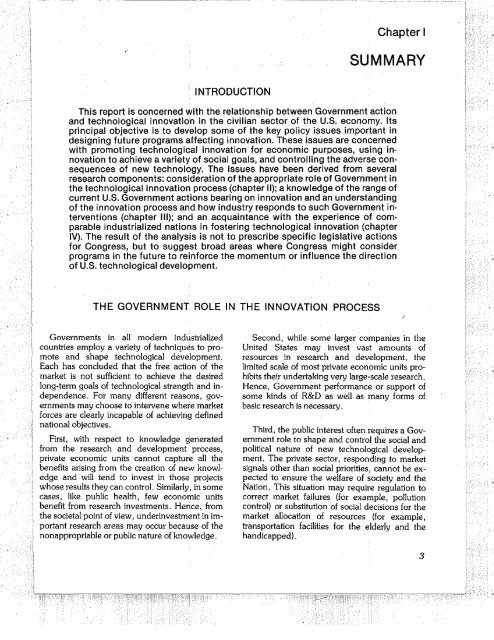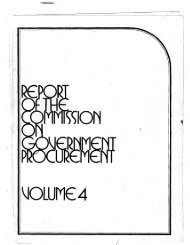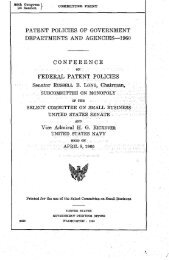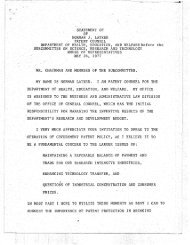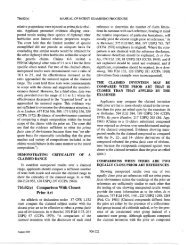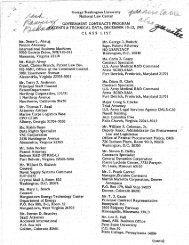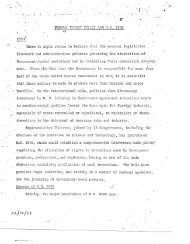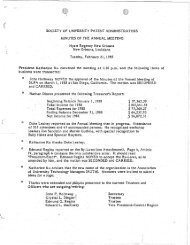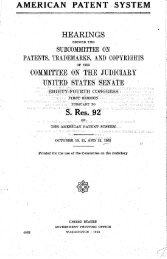Office of Technology Assessment - Bayhdolecentral
Office of Technology Assessment - Bayhdolecentral
Office of Technology Assessment - Bayhdolecentral
Create successful ePaper yourself
Turn your PDF publications into a flip-book with our unique Google optimized e-Paper software.
INTRODUCTION<br />
Chapter I<br />
SUMMARY<br />
This report is concerned with the relationship between Government action<br />
and technological innovation in the civilian sector <strong>of</strong> the U.S. economy. Its<br />
principal objective is to develop some <strong>of</strong> the key policy issues important in<br />
designing future programs affecting innovation. These issues are concerned<br />
with promoting technological innovation for economic purposes, using innovation<br />
to achieve a variety <strong>of</strong> social goals, and controlling the adverse consequences<br />
<strong>of</strong> new technology. The issues have been derived from several<br />
research components: consideration <strong>of</strong> the appropriate role <strong>of</strong> Government in<br />
the technological innovation process (chapter II); a knowledge <strong>of</strong> the range <strong>of</strong><br />
current U.S.Government actions bearing on innovation and an understanding<br />
<strong>of</strong> the innovation process and how industry responds to such Government interventions<br />
(chapter III); and an acquaintance with the experience <strong>of</strong> comparable<br />
industrialized nations in fostering technological innovation (chapter<br />
IV). The result <strong>of</strong> the analysis is not to prescribe specific legislative actions<br />
for Congress, but to suggest broad areas where Congress might consider<br />
programs in the future to reinforce the momentum or influence the direction<br />
<strong>of</strong> U.S.technological development.<br />
THE GOVERNMENT ROLE IN THE INNOVATION PROCESS<br />
Governments in all modern industrialized<br />
countries employ a variety <strong>of</strong> techniques to promote<br />
and shape technological development.<br />
Each has concluded that the free action <strong>of</strong> the<br />
market is not sufficient to achieve the desired<br />
long-term goals <strong>of</strong> technological strength and independence.<br />
For many different reasons, governments<br />
may choose to intervene where market<br />
forces are clearly incapable <strong>of</strong> achieving defined<br />
national objectives.<br />
First, with respect to knowledge generated<br />
from the research and development process,<br />
private economic units cannot capture all the<br />
benefits arising from the creation <strong>of</strong> new knowledge<br />
and will tend to invest in those projects<br />
whose results they can control. Similarly, in some<br />
cases, like public health, few economic" units<br />
benefit from research investments. Hence, from<br />
the societal point <strong>of</strong> view, underinvestment in important<br />
research areas may occur because <strong>of</strong> the<br />
nonappropriable or public nature <strong>of</strong> knowledge.<br />
Second, while some larger companies in the<br />
United States may invest vast amounts <strong>of</strong><br />
resources in research and development, the<br />
limited scale <strong>of</strong> most private economic units prohibits<br />
their undertaking very large-scale research.<br />
Hence, Government performance or support <strong>of</strong><br />
some kinds <strong>of</strong> R&D as well as many forms <strong>of</strong><br />
basic research is necessary.<br />
Third, the public interest <strong>of</strong>ten requires a Government<br />
role to shape and control the social and<br />
political nature <strong>of</strong> new technological development.<br />
The private sector, responding to market<br />
signals other than social priorities, cannot be expected<br />
to ensure the welfare <strong>of</strong> society and the<br />
Nation. This situation may require regulation to<br />
correct market failures (for example, pollution<br />
control) or substitution <strong>of</strong> social decisions for the<br />
market allocation <strong>of</strong> resources (for example,<br />
transportation facilities for the elderly and the<br />
handicapped) .<br />
3


